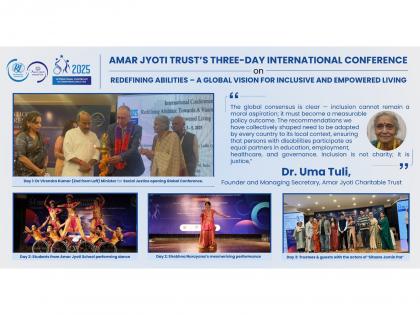Amar Jyoti Trust's Global Conference on "Redefining Abilities" Concludes with Roadmap for Inclusive and Empowered Living
By ANI | Updated: November 8, 2025 10:55 IST2025-11-08T10:53:23+5:302025-11-08T10:55:03+5:30
VMPL New Delhi [India], November 8: The three-day International Conference on "Redefining Abilities - A Global Vision for Inclusive ...

Amar Jyoti Trust's Global Conference on "Redefining Abilities" Concludes with Roadmap for Inclusive and Empowered Living
VMPL
New Delhi [India], November 8: The three-day International Conference on "Redefining Abilities - A Global Vision for Inclusive and Empowered Living", organized by Amar Jyoti Charitable Trust in collaboration with Rehabilitation International (RI), New York, concluded on Wednesday at the India International Centre, New Delhi, with a powerful set of recommendations and renewed commitment toward an inclusive, equitable, and empowered society.
Delegates from over 25 countries, including global experts, policymakers, educators, researchers, and advocates, participated in the conference, which served as a milestone dialogue on advancing disability rights, accessibility, and inclusion in the 21st century. There were more than 30 national and international plenary speakers and over 42 research presentations during the conference.
Delivering the concluding remarks, Dr. Uma Tuli, Founder and Managing Secretary, Amar Jyoti Charitable Trust, summarized the key outcomes of the deliberations.
She emphasized that the conference's discussions across five core areas Policy and Advocacy, Inclusive Education, Research and Innovation, Legal Empowerment, and Media Sensitization have led to actionable recommendations that must now be translated into measurable implementation by governments, institutions, and communities.
"The global consensus is clear inclusion cannot remain a moral aspiration; it must become a measurable policy outcome. The recommendations we have collectively shaped need to be adapted by every country to its local context, ensuring that persons with disabilities participate as equal partners in education, employment, healthcare, and governance. Inclusion is not charity; it is justice," said Dr. Uma Tuli.
The conference called for integrating community-based inclusive development (CBID) with policy frameworks, adopting the WHO's International Classification of Functioning, Disability and Health (ICF) model for certification, and mainstreaming inclusive education through Universal Design for Learning (UDL).
Addressing Valedictory session, Ms. Manmeet Kaur, Additional Secretary, Department of Empowerment of Persons with Disabilities (DEPwD), emphasized the need for outcome-based evaluation of government programs and the inclusion of key performance indicators (KPIs) in all disability-related schemes.
"Policies and schemes must have measurable outcomes to assess their real impact. Accessibility and inclusion should not remain the responsibility of one department they must be owned by every ministry, every institution, and every citizen," she observed.
She also highlighted the importance of financial and institutional commitment across ministries, ensuring that accessibility physical, digital, and attitudinal becomes integral to all public services.
Former Secretary to the Government of India, Ms. Stuti Kakkar, underpinned the importance of economic empowerment as the cornerstone of true inclusion.
"Inclusion without economic independence remains incomplete. We must create structured pathways for persons with disabilities to access entrepreneurship, vocational training, and sustainable livelihoods. Economic empowerment transforms not just individuals but entire communities," she noted.
A deeply moving highlight of the final day was the special panel discussion featuring actors from the acclaimed film 'Sitaare Zameen Par' Naveen Mishra, Arush, and Vedant alongside their mothers Manisha, Sunita, and Rupali, moderated by Mr. Ferose VR, Senior Executive at SAP, author of "The Invisible Majority", and a leading global inclusion advocate.
The discussion reflected the emotional and social transformation that the film has brought to families of persons with disabilities. The mothers shared how the film gave their children not just visibility but respect and confidence, changing societal attitudes towards neurodiversity.
Ferose, who is also father of a differently abled son, concluded, "When families speak openly about disability, they give others permission to do the same. That honesty changes societies."
The evening of Day Two of the conference was a celebration of art, resilience, and creative expression. A mesmerizing dance performance by renowned classical (Kathak) dancer Shobhana Narayan, alongside spirited performances by students of Amar Jyoti School, left audiences deeply moved. Their indomitable spirit impressed the audience as their performances embodied the theme of the conference that ability knows no boundaries.
"The enthusiasm and grace of these children remind us that inclusion is not a favor extended to the few it is a collective joy shared by all," said one of the international delegates.
The day also featured plenary sessions on inclusive education, access to rehabilitation, and the empowerment of women and youth with disabilities, culminating in an evening of cultural unity and reflection.
On Day One, the conference was inaugurated by the Union Minister Dr. Virendra Kumar, Ministry of Social Justice and Empowerment, who reaffirmed India's commitment to equitable opportunities.
"Empowerment of persons with disabilities is not charity it is their right. Through education, skill development, and accessibility, we are determined to ensure that every individual can live with dignity and independence," the Minister said.
The three-day conference culminated in a shared commitment to make inclusion measurable, sustainable, and universal. The recommendations developed through the sessions will be compiled and presented to the Ministry of Social Justice and Empowerment, with proposals for their integration into future policy and programmatic frameworks.
(ADVERTORIAL DISCLAIMER: The above press release has been provided by VMPL.will not be responsible in any way for the content of the same.)
Disclaimer: This post has been auto-published from an agency feed without any modifications to the text and has not been reviewed by an editor
Open in app